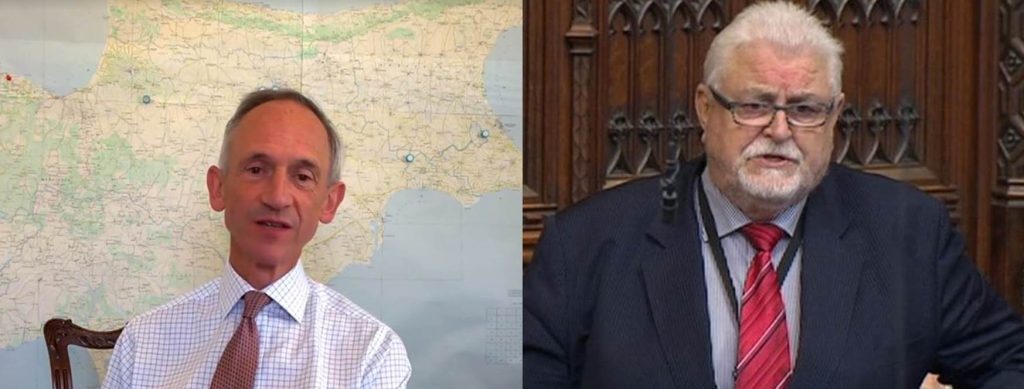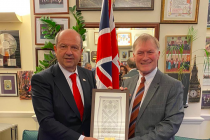The furore over British High Commissioner Matthew Kidd’s attempts to justify Great Britain’s handling of the Cyprus problem continues. One British peer has called for “disciplinary action” against the senior diplomat, while many other British expats and Turkish Cypriots have voiced their indignation at Mr Kidd’s comments.
In a very rare visit to the Turkish Republic of Northern Cyprus to address the British Residents’ Society (BRS) and guests in Girne on Tuesday 17 Oct., Mr Kidd discussed the UK’s role on the island, both historic and present, explaining that it was “dangerous” for Britain to recognise the TRNC officially, because it was a small, defenceless and “vulnerable” nation in a volatile part of the world.
When challenged over the role of the British Government and its failure to help Turkish Cypriots, who remain internationally embargoed in spite of pledges to the contrary, Mr Kidd told expats that they only see “part of the picture”.
He claimed that the country they were in was not the Turkish Republic of North Cyprus: “You say it exists, I do not recognise it.”
The High Commissioner also stated: “Our guarantor power status would have been completely incompatible with recognising the TRNC because what we guaranteed explicitly was the state of the affairs set up in the 1960 Constitution.”
British High Commissioner Matthew Kidd on the TRNC: “You say it exists, I do not recognise it”
Former TRNC Chief Negotiator Ergün Olgun, whose direct involvement in the Cyprus Talk spans from the 2004 Annan Plan to the UN’s Crans Montana Conference earlier this year, reacted:
“His Excellency Matthew Kidd said that recognising the TRNC would not only be ‘dangerous’, but ‘contrary to the UK’s Treaty obligations as a Guarantor’. Well, as a Turkish Cypriot, I would like to ask him whether he seriously thinks recognising the Greek Cypriots – who in December 1963 hijacked the partnership Republic of Cyprus – as the only legitimate government of the whole island was compatible with the “state of affairs” explicitly guaranteed by the UK, and as an extension of this, in fulfilling the UK’s Treaty obligations to protect the constitutional rights of both Greek and Turkish communities under the 1960 Treaty?”
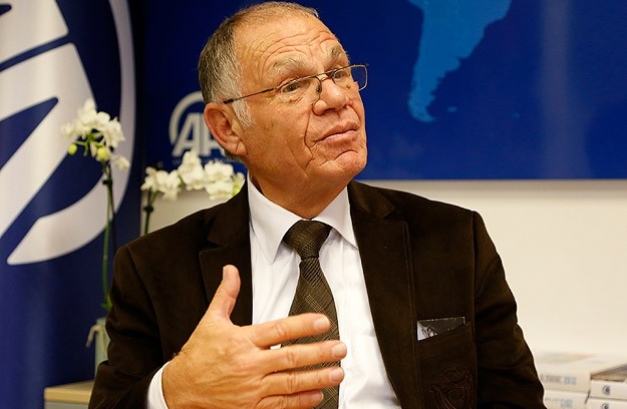
“Her Majesty’s government also told every other state to recognise the Greek Cypriots as the sole official government of the island. That basic betrayal by the British of the 1960 Treaty, and of the Turkish Cypriot community, was the cause of the island’s whole tragedy.”
“Personally I cannot think of a single positive instance in the past 53 years when they have carried out their so-called Guarantor function by helping the Turkish Cypriot community. The UK has continued to empower that hijacked Republic, while denying all the rights of the Turkish Cypriot people under the Constitution. They refused to join Guarantor Turkey to stop the union of Cyprus with Greece in 1974, another Treaty obligation not fulfilled. Worse still, they deliberately impose unjust embargoes on us.”
Former TRNC Chief Negotiator Ergün Olgun: “I cannot think of a single positive instance in the past 53 years when the UK has carried out their so-called Guarantor function by helping the Turkish Cypriot community.”
“The list of opportunities when Her Majesty’s Government could have intervened to re-establish equilibrium between the two communities in Cyprus and assist Turkish Cypriots is endless. Instead the UK has been silent on many vital issues, from the hellim PDO, to Greek Cypriot unilateral gas exploitation. Where was British support on Turkish Cypriot voting rights in European bodies, or to establish vital Confidence Building Measures such as Mobile Phone and Electricity? And where is the invitation to President Akıncı to the UK for formal talks?”
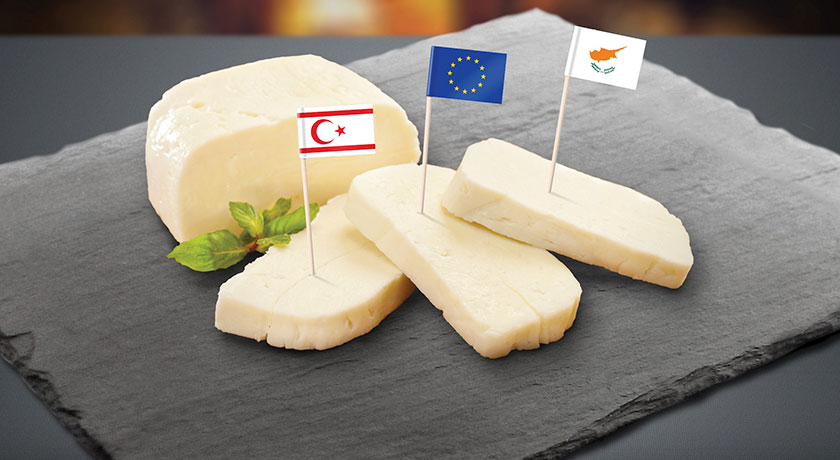
The experienced Turkish Cypriot advisor added that, “Following the 2004 referendum to unite the island, [then UN Secretary General] Kofi Annan completely destroyed the excuses used for maintaining Turkish Cypriot isolation. Yet the British Government, along with the Foreign and Commonwealth Office, ignores this and continues to trot out its tired refusal to support our political equality by hiding behind its so-called obligations as a Guarantor Power. In doing so, they are in direct breach of the very Treaty they claim to uphold.”
“When it comes to “dangerous” security risks, I cannot see what the British High Commissioner is referring to. If a two state solution is found, the security of the Greek Cypriot South will continue to be guaranteed by Greece under their Joint Defence Doctrine, and the security of the TRNC will continue to be guaranteed by Turkey.”
ATCA’s Kerem Hassan rebuts claims that recognising the tiny TRNC would be ‘dangerous’: “Has Mr Kidd not seen the bigger states in this region that are at war, compared to the real peace that exists in Cyprus?”
Association of Turkish Cypriots Abroad (ATCA) TRNC Representative and journalist Kerem Hasan echoed Mr Olgun’s comments: “As someone who attended the High Commissioner’s meeting at Chateau Lambousa, the remarks that the recognition of TRNC would be ‘dangerous’ because of its ‘small population’ and ‘vulnerability’ has caused great disappointment in the community. Has Mr Kidd not seen the ‘bigger’ states in this region that are at war and all the bloodshed, compared to the real peace that exists in Cyprus?”

One member of the British House of Lords is so “outraged” by the High Commissioner’s comments that he has called on the British government to reprimand him. According to a report in this week’s Cyprus Today, Northern Irish peer Lord Maginnis has submitted a written question demanding to know if Mr Kidd had been “speaking directly on [the Foreign and Commonwealth Office] instructions”, and whether the new position of the British authorities was to “repudiate” the identity and rights of Turkish Cypriots. If not, “What disciplinary action does the FCO intend to take?” asks Lord Maginnis.
Lord Maginnis has pushed the UK Foreign and Commonwealth Office on whether Matthew Kidd was “speaking directly on [official] instructions”
The former colonial ruler’s poor attitude is not limited to those currently living in North Cyprus. Britain has also insulted its own war dead in its eagerness to avoid offending the Greek Cypriots, claims one resident high-ranking former British soldier.
In 2014, the UK’s Police Roll of Honour Trust raised many thousands of pounds to erect a granite memorial in Cyprus to commemorate 62 British, Turkish and Greek Cypriot police who died in the 1955-60 Troubles. Although these slain men had all held Commissions from the Crown, the British High Commission refused to send a single representative of the Queen to the dedication ceremony, because it was afraid it might thereby annoy Greek Cypriots by “recognising” the Turkish Republic of Northern Cyprus”.
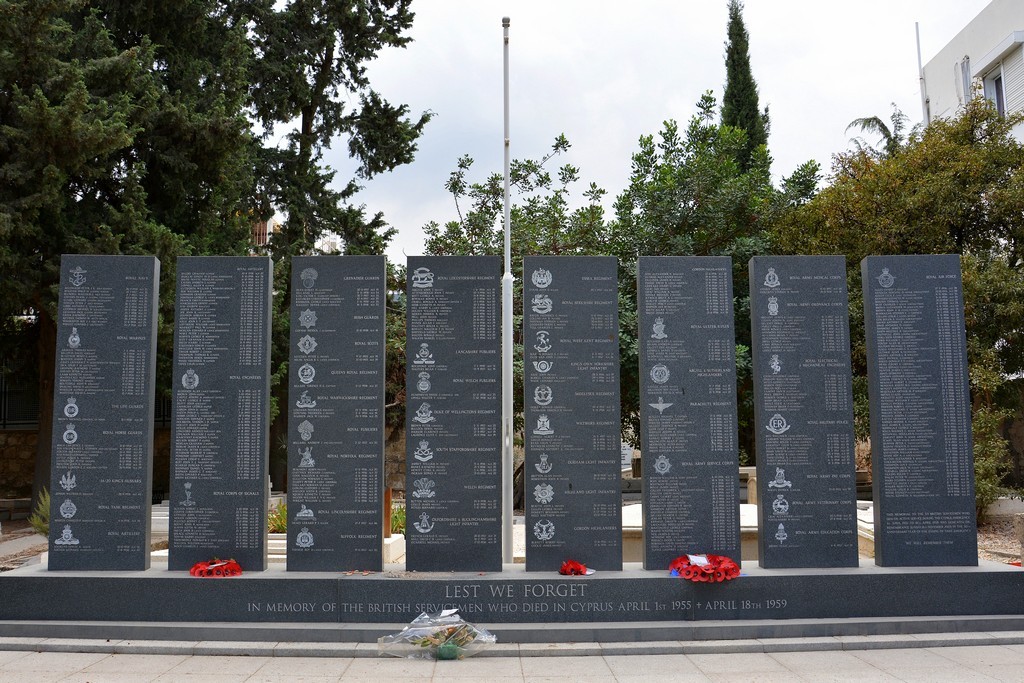
This echoed the shameful behaviour in 2009 when Peter Millet, the British High Commissioner, refused to attend the dedication of the memorial to 371 servicemen killed during the Cyprus Emergency. In the end the High Commissioner was ordered to attend with a bad grace and promptly fled back to Nicosia.
There has never been any official UK representation at the annual Remembrance Day ceremony since, despite the large numbers of veterans and families of the dead, who come from the UK every year.
Colonel John Hughes-Wilson: “The High Commissioner and the British High Commission know they should hang their heads in shame…[they are] little more than a Greek Cypriot mouthpiece.”
Cyprus resident Colonel John Hughes-Wilson, a former UK Military Intelligence Officer in Cyprus after the 1974 intervention, and a man of impeccable patriotism, wrote in his Cyprus Today column in 2014:
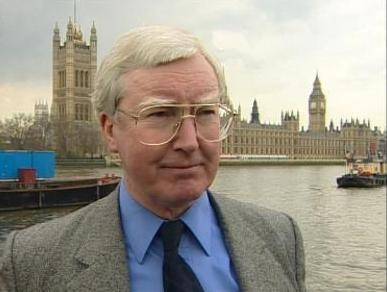
“The High Commissioner and the British High Commission know they should hang their heads in shame. Her Majesty’s Government’s cowardly absence from the ceremony to honour the murdered policemen is an insult to the dead: British, Greek and Turkish Cypriot police, all of whom died for Britain. This Saturday, the FCO’s cowardice and hypocrisy make decent folk ashamed to be British.”
Hughes-Wilson also spoke for the vast majority of the TRNC’s British expats, and Turkish Cypriots when he claimed: “The British High Commission has now become little more than a Greek Cypriot mouthpiece.” The current High Commissioner has done little to dispel that view.
During his BRS address at Chateau Lambousa, Lapta, a fortnight ago, Mr Kidd also failed to impress his audience when he assured them that the power of the Greek Orthodox Church in the South had waned, and that anti-Turkish racism was no longer prevalent.
“It just isn’t like that anymore,” he told his audience, dismissing reported incidents as “hooliganism,” adding “There has not been on either side any organised violence, any group, any tribal tension.”
His remarks were challenged by UK resident Fahri Zihni, chairman of the Turkish Cypriot human rights campaigning group Embargoed! He told T-VINE he was “shocked” at Mr Kidd’s dismissal of Greek Cypriot racist attitudes: “We cannot agree over these remarks. Under EU law, racist attacks are taken very seriously. It is shocking to hear the High Commissioner compare these attacks to hooliganism.”
Embargoed! has regularly presented dossiers on racist attacks suffered by Turkish Cypriots to the annual Human Dimensions conference of the OSCE, the Organisation for Security and Co-operation in Europe. In recent years, many Turkish Cypriots – including activists committed to uniting the island – have raised concerns over the increasing number of racist and violent incidents.
In an interview with Cyprus Mail in September, Oya Akin, a member of Unite Cyprus Now, said she’d stopped driving in the South due to her unease at being easily identified through the car’s number plate. She added that she had personally witnessed several attacks on Turkish Cypriot vehicles and knows of at least 20 incidents, “which have been reported to police – and the worst part, she adds, is that no-one’s been arrested, let alone punished”.
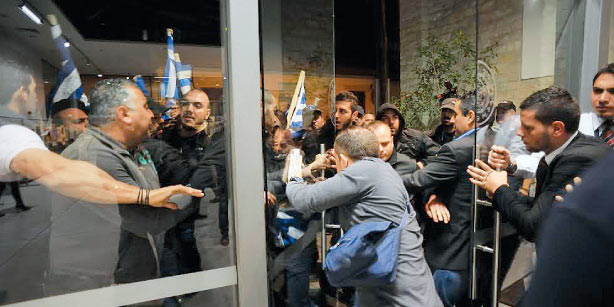
The rise of the far-right in South Cyprus has culminated in two members of the Cyprus National People’s Front (ELAM) being elected into the Greek Cypriot Parliament in May 2016. The party is openly anti-Turkish Cypriot and anti-Semitic; central to its policies are ridding the island of its Turkish inhabitants to establish a purely Hellenic state.
The Bishop Pavlos of Kyrenia told Greek Cypriots on the eve of the 2004 referendum that they would be ‘doomed to a life in hell’ if they voted for the Annan Plan. 76% voted against
ELAM supporters have previously issued death threats to a Greek Cypriot footballer who had signed for a club in North Cyprus, attacked a venue where former President Mehmet Ali Talat was speaking, and intimidated a businessman in the South for working with potato farmers from the North. More worryingly, politicians from mainstream Greek Cypriot parties are regularly seen to co-operate with the two ELAM Members of Parliament, supporting their actions inside and outside of Parliament, making it is impossible to dismiss the growing threat they pose.
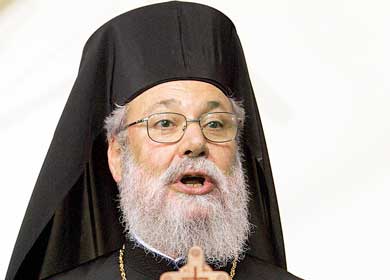
As to the power and influence of the Orthodox Church in Cyprus, contrary to Mr Kidd’s assertions, these remain high. The Church played an important role in the rise of ELAM, and continues to promulgate views that engender the deep-rooted hatred of Turks and an unwillingness to embrace their Turkish Cypriot neighbours as equals.
Everyone on the island remembers Bishop Pavlos of Kyrenia telling Greek Cypriots on the eve of the 2004 referendum that they would be ‘doomed to a life in hell’ if they voted for the United Nations backed Annan Plan to reunify the island. Seventy six percent of voters in the South subsequently voted against the Plan. A decade on, attitudes amongst the Greek Cypriot clergy have not improved.
In 2011, Archbishop Chrysostomos II infamously told his flock he’d rather ‘read books by candlelight than use Turkish electricity’, after learning that the Greek Cypriot authorities were buying in power from the North following a huge explosion that destroyed the Vasilikos Power Station.
More recently, the Archbishop admitted in a television interview that he supports ELAM. He reiterated his support for them in May 2016, telling the press he was “satisfied” that two ELAM candidates had been elected as MPs.
Leyla Kemal, the head of the Council of Turkish Cypriot Associations in Britain, described Mr Kidd as talking “rubbish”. The diplomat is due to retire next year. The FCO have already announced Mr Kidd’s successor as Mr Stephen Lillie, who will take over in the Spring of 2018.
Main picture at top (L-R): British High Commissioner Matthew Kidd, and Lord Maginnis of Drumglass

